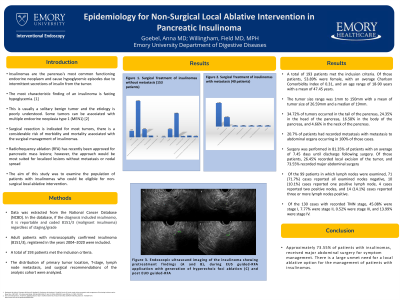Monday Poster Session
Category: Interventional Endoscopy
P2297 - Epidemiology for Non-Surgical Local Ablative Intervention in Pancreatic Insulinoma
Monday, October 23, 2023
10:30 AM - 4:15 PM PT
Location: Exhibit Hall

Has Audio

Anna Goebel, MD
University of Pennsylvania
Atlanta, GA
Presenting Author(s)
Anna Goebel, MD1, Theresa W. Gillespie, PhD, MA, BSN2, Vaishali Patel, MD2, Jordan Orr, MD2, Steven Keilin, MD2, Saurabh Chawla, MD, FACG2, Field Willingham, MD, MPH3
1University of Pennsylvania, Atlanta, GA; 2Emory University School of Medicine, Atlanta, GA; 3Emory University, Atlanta, GA
Introduction: Insulinomas are the most common functioning endocrine neoplasm of the pancreas and cause hypoglycemic episodes due to intermittent secretion of insulin. While surgical resection is indicated for most tumors, there is a considerable risk of morbidity and mortality associated with the surgical management of insulinomas. The aim of this study was to examine the population of patients with insulinomas who could be eligible for non-surgical local ablative intervention.
Methods: Data was extracted from National Cancer Database (NCBD). Adult patients with microscopically confirmed insulinoma, registered in the years 2004–2020 were included. Patients were excluded if there was no report on metastasis or unknown tumor size.
Results: A total of 193 patients met the inclusion criteria. Of those patients, 53.9% were female, with an average Charlson Comorbidity Index of 0.31, and an age range of 18-90 years with a mean of 47.45 years. The tumor size range was 1mm to 150mm with a mean of tumor size of 26.59mm and a median of 19mm. 34.7% of tumors occurred in the tail of the pancreas, 24.4% in the head of the pancreas, 16.6% in the body of the pancreas, and 4.7% in the neck of the pancreas. 40 patients had metastatic involvement. Of the 99 patients in which lymph nodes were examined, 71 cases reported all examined nodes negative, 10 cases reported one positive lymph node, 4 cases reported two positive nodes, and 14 cases reported three or more lymph nodes positive. Of the 130 cases with recorded TMN stage, 45.1% were stage I, 7.8% were stage II, 0.5% were stage III, and 14.0% were stage IV. Surgery was performed in 81.4% of patients with an average of 7.45 days until discharge following surgery. Of those patients, 26.5% recorded local excision of the tumor, and 73.6% recorded major abdominal surgery.
Discussion: Reflecting the symptomatic nature of the tumors, approximately 73.6% of patients with insulinomas received major abdominal surgery. A local ablative option for the management of patients with insulinoma might reduce the need for major pancreatic surgery in this population.
Disclosures:
Anna Goebel, MD1, Theresa W. Gillespie, PhD, MA, BSN2, Vaishali Patel, MD2, Jordan Orr, MD2, Steven Keilin, MD2, Saurabh Chawla, MD, FACG2, Field Willingham, MD, MPH3. P2297 - Epidemiology for Non-Surgical Local Ablative Intervention in Pancreatic Insulinoma, ACG 2023 Annual Scientific Meeting Abstracts. Vancouver, BC, Canada: American College of Gastroenterology.
1University of Pennsylvania, Atlanta, GA; 2Emory University School of Medicine, Atlanta, GA; 3Emory University, Atlanta, GA
Introduction: Insulinomas are the most common functioning endocrine neoplasm of the pancreas and cause hypoglycemic episodes due to intermittent secretion of insulin. While surgical resection is indicated for most tumors, there is a considerable risk of morbidity and mortality associated with the surgical management of insulinomas. The aim of this study was to examine the population of patients with insulinomas who could be eligible for non-surgical local ablative intervention.
Methods: Data was extracted from National Cancer Database (NCBD). Adult patients with microscopically confirmed insulinoma, registered in the years 2004–2020 were included. Patients were excluded if there was no report on metastasis or unknown tumor size.
Results: A total of 193 patients met the inclusion criteria. Of those patients, 53.9% were female, with an average Charlson Comorbidity Index of 0.31, and an age range of 18-90 years with a mean of 47.45 years. The tumor size range was 1mm to 150mm with a mean of tumor size of 26.59mm and a median of 19mm. 34.7% of tumors occurred in the tail of the pancreas, 24.4% in the head of the pancreas, 16.6% in the body of the pancreas, and 4.7% in the neck of the pancreas. 40 patients had metastatic involvement. Of the 99 patients in which lymph nodes were examined, 71 cases reported all examined nodes negative, 10 cases reported one positive lymph node, 4 cases reported two positive nodes, and 14 cases reported three or more lymph nodes positive. Of the 130 cases with recorded TMN stage, 45.1% were stage I, 7.8% were stage II, 0.5% were stage III, and 14.0% were stage IV. Surgery was performed in 81.4% of patients with an average of 7.45 days until discharge following surgery. Of those patients, 26.5% recorded local excision of the tumor, and 73.6% recorded major abdominal surgery.
Discussion: Reflecting the symptomatic nature of the tumors, approximately 73.6% of patients with insulinomas received major abdominal surgery. A local ablative option for the management of patients with insulinoma might reduce the need for major pancreatic surgery in this population.
Disclosures:
Anna Goebel indicated no relevant financial relationships.
Theresa Gillespie indicated no relevant financial relationships.
Vaishali Patel indicated no relevant financial relationships.
Jordan Orr indicated no relevant financial relationships.
Steven Keilin indicated no relevant financial relationships.
Saurabh Chawla indicated no relevant financial relationships.
Field Willingham: Boston Scientific – Grant/Research Support. Cancer Prevention Pharmaceuticals – Grant/Research Support. Cook Medical – Grant/Research Support. PCI Biotech – Grant/Research Support. Steris / CSA Medical – Grant/Research Support.
Anna Goebel, MD1, Theresa W. Gillespie, PhD, MA, BSN2, Vaishali Patel, MD2, Jordan Orr, MD2, Steven Keilin, MD2, Saurabh Chawla, MD, FACG2, Field Willingham, MD, MPH3. P2297 - Epidemiology for Non-Surgical Local Ablative Intervention in Pancreatic Insulinoma, ACG 2023 Annual Scientific Meeting Abstracts. Vancouver, BC, Canada: American College of Gastroenterology.
